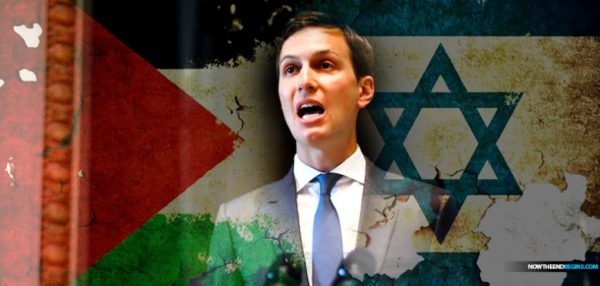 White House adviser Jared Kushner, giving a broad outline of a U.S. peace plan for the Middle East, said it will address final-status issues of the Israeli-Palestinian conflict, including establishing borders.
White House adviser Jared Kushner, giving a broad outline of a U.S. peace plan for the Middle East, said it will address final-status issues of the Israeli-Palestinian conflict, including establishing borders.
In an interview broadcast on Monday on Sky News Arabia during a visit to U.S.-allied Gulf Arab states, Kushner made no specific mention of a Palestinian state, whose creation had been at the foundation of Washington’s peace efforts for two decades. But he said the long-awaited peace proposal would build on “a lot of the efforts in the past,” including the 1990s Oslo accords that provided a foundation for Palestinian statehood, and would require concessions from both sides.
U.S. officials said that Kushner, who is U.S. President Donald Trump’s son-in-law, is expected to focus on the economic component of the plan during the weeklong trip.
But in the interview, Kushner said the proposal also contained a “political plan, which is very detailed” and “really about establishing borders and resolving final-status issues.”
Kushner was given responsibility over Washington’s Israel-Palestinian policy, along with other top postings, after his father-in-law was inaugurated in January 2017.
Kushner’s reference to borders heated up Israel’s election campaign on Tuesday. Far-right politicians portrayed his comments as a harbinger to a Palestinian state they oppose.
Kushner said Washington would present the plan only after the April 9 vote.
Palestinians, who have refused to discuss any peace blueprint with the United States in the wake of Trump’s recognition of Jerusalem as Israel’s capital in 2017, also viewed Kushner’s comments with suspicion.
Saeb Erekat, the chief Palestinian negotiator in talks that collapsed in 2014, said on Twitter that “Trump’s map” envisaged “isolated territories for the Palestinians.”
Israel has long rejected any return to what it has described as indefensible boundaries that existed before it captured the West Bank, East Jerusalem and the Gaza Strip in the 1967 Middle East war.
Palestinians seek to establish a state in the West Bank and Gaza Strip with East Jerusalem as its capital. Israel pulled troops and settlers out of the Gaza Strip, now controlled by Hamas Islamists, in 2005.
Kushner, Trump’s Middle East envoy Jason Greenblatt, and Brian Hook, the State Department envoy for Iran, are not expected to visit Israel.
REUTERS

Leave a Reply
You must be logged in to post a comment.